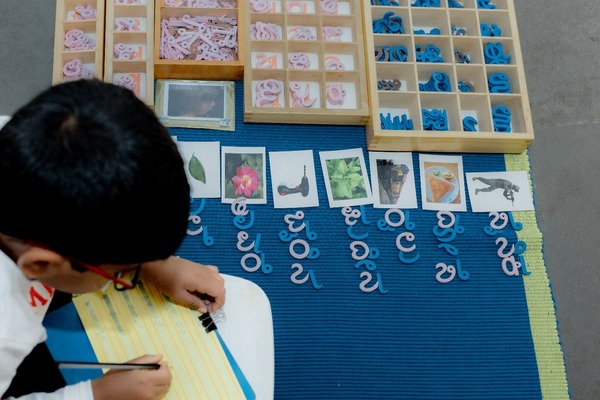
Montessori
education is a unique approach focused on child-led learning. This approach was
originally developed by Dr. Maria Montessori, who encouraged independent
exploration and discovery in an environment specially prepared for children's
developmental needs. Dr. Montessori believed that children have an inner drive
to learn and grow. Montessori programs aim to support this drive by creating an
environment where children can pursue their interests, make choices, and
experience the satisfaction of personal achievement.
Montessori
classrooms offer a range of materials and activities designed to support
natural curiosity and growth. They encourage children to work independently,
make choices, and engage in activities that align with their interests and
developmental needs. The core principles of Montessori schooling are respect
for the child, hands-on educational experience, a prepared environment, and
mixed-age classrooms.
In this
blog, we will explore how Montessori education nurtures essential qualities,
guiding its students toward becoming self-driven, confident, and capable
individuals.
Understanding Independence in Montessori Education
Independence
in Montessori education means more than just doing tasks alone. It involves
children becoming self-directed and developing a sense of control over their
own lives. Independent children learn to make decisions, set goals, and take
responsibility for their actions.
How Does Montessori Education Encourage Independence?
Montessori
education encourages independence as the children work on tasks that have been
planned to be a little challenging by their age. For example, in a Pre-Primary
classroom, children will involve themselves in practical life activities like
pouring, sorting, and cleaning. These are simple, purposeful, and give a sense
of accomplishment.
Examples of Activities That Build Independence in Montessori Classrooms
Practical
life activities, such as pouring water or buttoning a shirt, help young
children develop independence. For older students, activities like research
projects or organizing a classroom event encourage self-reliance and
responsibility. Each task promotes skill-building while allowing children to
experience autonomy. For example, during the Pre-Primary levels, children learn
basic tasks such as putting on their coats or setting up snack stations, which
teaches them a sense of responsibility.
The Role of the Montessori Teacher in Promoting Independence
Montessori
teachers guide children without directing them. Thus, instead of guiding every
activity, the teacher observes and guides children whenever it becomes
necessary and provides space for independent learning. This method allows
children to take charge of their learning and be more independent over time.
How Independence in Montessori Education Prepares Children for the Future?
Developing
independence prepares children for real-world challenges. Independent students
are more likely to take initiative, adapt to new situations, and make
thoughtful decisions. By encouraging independence from a young age, Montessori
education gives children tools to succeed in all areas of life.
The Importance of Self-Motivation in Montessori Education
Self-motivation
in Montessori education refers to motivation generated from within, a child's
drive to learn and explore. Montessori does not train students through rewards
and punishments or grades; students are encouraged to have fun with the
learning process. It encourages curiosity and continued efforts to learn.
How Montessori Education Nurtures Intrinsic Motivation?
Montessori
classrooms nurture intrinsic motivation by allowing the child to explore topics
that are of interest. When the child is interested in an activity, he will most
likely focus and engage in it. If a child's passion lies in learning about
plants, with the connection of the Montessori approach, the child may explore
this interest deeply both through class and outdoor activities.
The Connection between Independence and Self-Motivation
Independence
and self-motivation go hand in hand in Montessori education. Self-motivation
develops from independence to make choices. With freedom of choice, a student
develops the desire to learn and grow by pursuing an interest.
Real-Life Examples of Self-Motivation in Montessori Students
A classic
example of self-motivation is when a Montessori child finishes a puzzle or math
problem without assistance and dashes right into a more challenging one next.
The eagerness to take on new challenges remains a manifestation of internal
motivation nurtured in the classics by Montessori education.
The Role of Montessori Materials in Fostering Self-Motivation
Montessori
materials are designed to be self-correcting and interesting, where children
learn with experimentation. For instance, sensorial materials give children the
opportunity to explore shapes, sizes, and colours at their own pace. This
hands-on experience reinforces self-motivation by allowing children to work at
their own pace without the constant intervention of a teacher.
How Self-Motivation Impacts Academic and Personal Growth?
Self-motivated
students are more likely to take responsibility for their own success. This
approach builds resilience and adaptability. Over time, self-motivation helps
children develop problem-solving skills, determination, and a sense of pride in
their achievements, leading to lifelong benefits.
The Montessori Learning Environment
The
Montessori classroom was designed to be a prepared environment, supporting
independence and self-motivation. Everything in the classroom, from the
child-sized furniture to the orderly arrangement of the learning materials,
serves a purpose. It enables children to function freely move, choose tasks,
and involve in some task-orientated activities while carrying such an activity
without any immediate adult supervision.
The Role of Montessori Materials in Promoting Independent Learning
Montessori
materials are designed for hands-on exploration. These tools allow children to
work independently, discovering concepts at their own pace. Each material has a
clear purpose, which encourages children to experiment, learn, and become more
independent learners.
The Significance of Choice and Freedom in the Montessori Classroom
Choice is fundamental in Montessori education. Children are free to select their activities, manage their time, and move around the classroom. This freedom encourages them to make decisions, solve problems, and build self-confidence.
How Mixed-Age Classrooms Enhance Independence and Motivation?Through
mixed-age classrooms, children learn from their peers while forming bonds with
one another. The younger children are inspired from their elders, whereas older
students learn essential leadership qualities as they tend to guide the young
ones. Such an environment provides a conducive basis for adjusted learning
experiences to separately motivate independence, as children are encouraged to
help each other and work in collaboration on their explorations.
The Role of the Montessori Teacher
In
Montessori education, teachers are guides rather than instructors. In observing
the interests and needs of each child, they intervene only when necessary. In
entrusting the direction of their learning to children, they instill in
children the virtue of self-motivation and independence.
The Balance between Guidance and Independence
Montessori
teachers provide gentle guidance while allowing children freedom. They
encourage students to explore on their own but are available to offer support
when needed. This balance helps children gain confidence, independence, and a
sense of responsibility.
Strategies Montessori Teachers Use to Encourage Self-Motivation
Montessori teachers use various strategies to promote
self-motivation in children. They often give positive reinforcement, offer
choices, and use real-world tasks that connect to the child’s interests. For
instance, if a child loves animals, the teacher might introduce counting by
using animal figures. The child becomes motivated to complete the activity
because it aligns with their curiosity. This approach helps children feel
excited about learning and encourages them to explore further on their own.
The Importance of Observation in Supporting Independent Learning
The key
skill of the Montessori teacher is observation. Observing gives them insight
into each child's unique learning style, interests, and areas of growth. Such
knowledge helps them create an experience that will support the child in
becoming independent and self-motivated.
Benefits of Independence and Self-Motivation Beyond Montessori Education
Montessori
education cultivates self-sufficient, adaptable individuals. Children develop
skills such as critical thinking, decision-making, and resilience, which
benefit them throughout life. Independent and motivated learners are more
likely to succeed in varied environments and face challenges with confidence.
How Montessori-Educated Children Perform in Traditional Educational Settings?
Children
from Montessori programs often adapt well to traditional schools. They are more
likely to take initiative, solve problems independently, and stay motivated in
structured settings. Their strong foundation in self-motivation helps them
succeed in traditional classrooms.
Independence and Self-Motivation in Adulthood: A Montessori Perspective
Montessori
education builds skills that extend into adulthood. Adults who grew up in
Montessori environments value personal growth, set goals independently, and
approach challenges with confidence. Independence and motivation prepares for
lifelong success.
Success Stories of Montessori-Educated Individuals
There are
numerous success stories from people who went to school in Montessori and have
greatly contributed in various fields. It is worthy of mention that Jeff Bezos
and Sergey Brin describe some significant amounts of their success as due to
the independence that they developed in Montessori schools.
Challenges and Solutions in Fostering Independence and Self-Motivation
Some
children may struggle with independence due to fear of failure or a desire for
approval. Montessori teachers address this by encouraging children to try,
explore, and learn without fear of making mistakes. They provide support to
help children develop confidence in their abilities.
Solutions to Overcome Barriers to Self-Motivation
Building
self-motivation can take time. Montessori teachers use strategies like positive
reinforcement and choice to inspire children. By offering engaging activities
that match each child’s interests, they create a supportive environment where
motivation grows naturally.
How Parents Can Support Independence and Motivation at Home?
Parents
can encourage independence by allowing children to make simple choices, like
selecting their clothing or setting the table. Creating a child-friendly space
at home with accessible materials allows children to take responsibility and
build self-confidence in their abilities.
Final Thoughts
Independence
and self-motivation are skills cultivated under Montessori's approach that go
substantially beyond what happens within the class. Through these, children are
prepared for lifetime success by becoming self-motivated and responsible
individuals in society. These capabilities drive children to be strong,
observant, and capable learners. In return, this has enabled students to have
the confidence to handle various aspects of life.
Consider
enrolling your children in Vidyanjali if you want them to experience Montessori
education at an early stage. Connect with us at info@vidyanjali.in
and resolve all your queries regarding the admission process.
Frequently Asked Questions (FAQ)
1.
Can Montessori Education Work for All Children?
Montessori
education adapts to each child’s unique needs. Its flexible approach makes it
effective for children of various personalities and learning styles. However,
some children may require additional support, depending on their individual
needs.
2.
How Does Montessori Address Different Learning Styles?
Montessori
classrooms provide materials and activities for different learning styles,
whether visual, auditory, or kinesthetic. Children explore these materials at
their own pace and learn in ways that feel natural to them.
3.
Is Montessori Education Suitable for Children with Special
Needs?
Yes,
Montessori education is often beneficial for children with special needs. Its
emphasis on individual learning and sensory activities makes it adaptable.
Teachers observe and adjust to ensure each child’s needs are met.
4.
How Do Montessori Schools Measure Student Success?
Montessori
schools use observational assessments, not grades, to track progress. Teachers
keep detailed notes on each child’s development. Progress is measured by
personal growth, confidence, and mastery of skills rather than test scores.
5.
How Can I Encourage Independence and Self-Motivation at Home?
Encourage
independence by giving children age-appropriate responsibilities. Allow them to
make choices and complete tasks on their own. Praising effort and providing a
supportive environment helps children build confidence and motivation.



